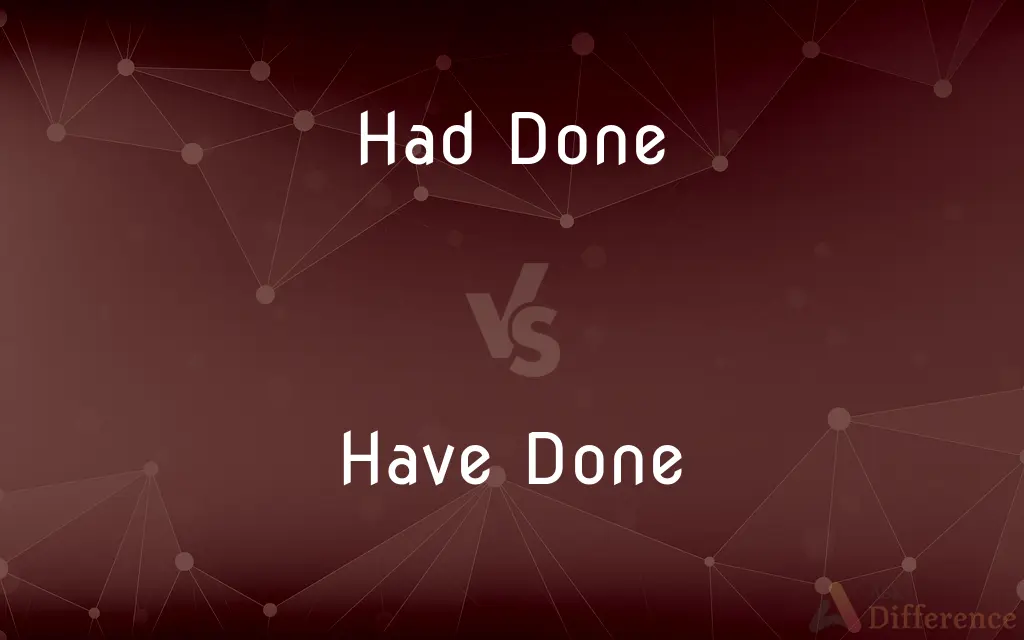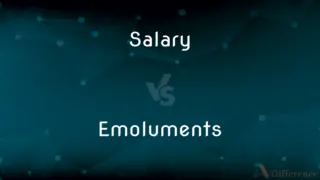Had Done vs. Have Done — What's the Difference?
By Tayyaba Rehman — Published on November 9, 2023
"Had done" is the past perfect tense, indicating an action completed before another past event. "Have done" is the present perfect tense, indicating an action completed at an unspecified time in the past.

Difference Between Had Done and Have Done
Table of Contents
ADVERTISEMENT
Key Differences
"Had done" and "Have done" are both grammatical structures used to indicate actions that have been completed. However, they are used in different contexts and convey slightly different meanings.
"Had done" is used in the past perfect tense. This tense is used to talk about a completed action that happened before another event in the past. When you say "had done", you're referring to something that was already completed by the time another event occurred. For instance, "I had done my homework by the time the show started."
On the other hand, "Have done" is used in the present perfect tense. This tense talks about actions that have been completed at some point in the past but do not specify when. "Have done" is often used to emphasize the action itself rather than the specific time it took place. For example, "I have done my homework", does not specify when the homework was done, only that it's completed.
Both "Had done" and "Have done" are used to talk about completed actions, but their usage depends on the relationship between the action and the time being discussed. "Had done" is more about sequencing of past events, while "Have done" is more about the present relevance of a past action.
In summary, "Had done" sets a timeline of events in the past, positioning one event before another. In contrast, "Have done" simply acknowledges the completion of an action without pinpointing its exact occurrence in the past.
ADVERTISEMENT
Comparison Chart
Tense
Past Perfect
Present Perfect
Time Reference
Indicates action before another past event.
Indicates action in unspecified past with relevance to the present.
Example
"I had done the task before he arrived."
"I have done the task."
Relationship with another event
Often used with another past event for reference.
Doesn’t necessarily need another event for reference.
Emphasis
On sequencing of past events.
On completion of action with present relevance.
Compare with Definitions
Had Done
An expression in the past perfect tense.
I had done my best in the exam.
Have Done
Reflects a past action with present relevance.
She has done her task, so she can relax now.
Had Done
Used for an action finished before another past action.
She had done her homework by the time the movie started.
Have Done
Expresses life experiences without specific time.
He has done skydiving multiple times.
Had Done
Expresses a past action that sets a precedent.
They had done this before, so they knew what to expect.
Have Done
Highlights the result more than the exact time.
We have done what we promised.
Had Done
Indicates completion before a past event.
He had done his chores before going out.
Have Done
Indicates an action completed in the unspecified past.
They have done several projects together.
Had Done
Shows an earlier point in a past timeline.
By the time we arrived, the chef had done all the preparations.
Have Done
An expression in the present perfect tense.
I have done my assignment.
Common Curiosities
What tense is "Had Done"?
"Had Done" is in the past perfect tense.
What tense is "Have Done"?
"Have Done" is in the present perfect tense.
When do I use "Have Done"?
Use "Have Done" to discuss an action completed in the past with relevance to the present.
When do I use "Had Done"?
Use "Had Done" to discuss an action completed before another past event.
Why would I use "Had Done" instead of simple past tense?
Use "Had Done" to show an action's completion before another past event.
How does "Have Done" relate to the present?
"Have Done" has a connection to the present, emphasizing the action's completion and its present relevance.
What's a common mistake with "Had Done"?
Using "Had Done" without another past event for reference can be confusing.
Can "Had Done" and "Have Done" be used interchangeably?
No, they are used in different contexts and convey different meanings.
Is "Had Done" about specific times in the past?
No, "Had Done" emphasizes the sequence of past events rather than specific times.
Is "Had Done" used in conditional sentences?
Yes, "Had Done" is often used in the third conditional to discuss hypothetical situations in the past.
Does "Have Done" tell us when an action was completed?
No, "Have Done" indicates completion without specifying the exact time.
Which is more common in daily conversation, "Had Done" or "Have Done"?
"Have Done" is more commonly used in daily conversation due to its connection to the present.
Can "Have Done" be used to talk about life experiences?
Yes, it's often used to discuss life experiences without specifying when they happened.
What's a common mistake with "Have Done"?
Using "Have Done" when referring to a specific time in the past is incorrect.
Are both "Had Done" and "Have Done" about completion?
Yes, both indicate completed actions, but in different time frames.
Share Your Discovery
Previous Comparison
Silica vs. Silicon Dioxide
Next Comparison
Salary vs. EmolumentsAuthor Spotlight
Written by
Tayyaba RehmanTayyaba Rehman is a distinguished writer, currently serving as a primary contributor to askdifference.com. As a researcher in semantics and etymology, Tayyaba's passion for the complexity of languages and their distinctions has found a perfect home on the platform. Tayyaba delves into the intricacies of language, distinguishing between commonly confused words and phrases, thereby providing clarity for readers worldwide.













































